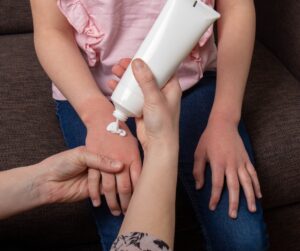Skin conditions such as eczema and psoriasis can cause confusion due to their similar appearance. However, they are distinct diseases with different causes, symptoms, and treatments. Recognizing these differences is essential for proper diagnosis and effective treatment. This article will explore the key differences between eczema and psoriasis, highlighting their causes, symptoms, triggers, and treatment options.
1. What is Eczema?
Eczema, also known as atopic dermatitis, is a chronic skin condition that causes inflammation, itching, and red, dry patches of skin. It most commonly affects infants and children but can persist into adulthood. Eczema is often linked to other allergic conditions, such as asthma or hay fever, and is believed to be caused by a combination of genetic and environmental factors.
Causes of Eczema
The exact cause of eczema is unknown, but it is believed to be related to a weakened skin barrier that allows irritants and allergens to penetrate the skin. Genetics also play a significant role, as people with a family history of eczema or other allergies are more likely to develop the condition. Environmental factors such as exposure to harsh soaps, pollution, or extreme weather can trigger eczema flare-ups.
Symptoms of Eczema
Eczema symptoms can vary depending on the age and severity of the condition, but common signs include:
- Red, inflamed patches of skin
- Itchy skin, which may worsen at night
- Dry, scaly, or cracked skin
- Thickened skin from constant scratching
- Small, raised bumps or blisters
Eczema often affects the face, hands, feet, and the folds of the elbows and knees.
2. What is Psoriasis?
Psoriasis is a chronic autoimmune condition that accelerates the skin's cell turnover rate. Normally, skin cells regenerate every 28-30 days, but in people with psoriasis, this process happens too quickly, leading to a buildup of skin cells that form scales. These scales can be thick, silvery, and flaky, which is the hallmark of psoriasis.
Causes of Psoriasis
Psoriasis is caused by an overactive immune response, which leads to the rapid production of skin cells. It is not fully understood why the immune system becomes overactive, but genetic factors and environmental triggers (such as infections, stress, and cold weather) are believed to contribute. Psoriasis is not contagious and cannot be spread by touch.
Symptoms of Psoriasis
The symptoms of psoriasis are generally more visible than those of eczema and include:
- Red patches of skin covered with thick, silvery-white scales
- Itchy, burning, or stinging sensations
- Cracked skin that may bleed
- Swollen or stiff joints (in cases of psoriatic arthritis)
- Pitting or abnormal growth of nails
Psoriasis often affects the scalp, elbows, knees, and lower back, and it can also cause the skin around the joints to become inflamed and painful.
3. Key Differences Between Eczema and Psoriasis
While both conditions involve the skin becoming inflamed, the following differences set eczema and psoriasis apart:
| Feature | Eczema | Psoriasis |
|---|---|---|
| Cause | Genetic and environmental factors; associated with allergies | Autoimmune disorder; rapid skin cell turnover |
| Appearance | Red, dry, itchy patches of skin | Red patches with thick, silvery-white scales |
| Common Areas Affected | Face, hands, feet, elbows, knees | Elbows, knees, scalp, lower back |
| Itchiness | Often intense, especially at night | Can be itchy, but pain and burning are also common |
| Age of Onset | Often starts in childhood, but can occur at any age | Can appear at any age, but commonly begins in early adulthood |
| Triggering Factors | Allergens, irritants, dry skin, stress, weather changes | Infections, stress, cold weather, skin injury |
4. Treatment Options for Eczema and Psoriasis
Both eczema and psoriasis are chronic conditions that require long-term management. While there is no cure for either, treatment can help control symptoms and flare-ups.
Treatments for Eczema
- Topical Corticosteroids: These are often prescribed to reduce inflammation and itching. They come in various strengths and should be used under a doctor's guidance to prevent side effects.
- Moisturizers: Keeping the skin well-moisturized is key to preventing dryness, a common trigger for eczema.
- Antihistamines: These can help control itching, especially at night.
- Immunomodulators: Medications like tacrolimus or pimecrolimus can help suppress the immune system to reduce inflammation.
- Avoiding Triggers: Identifying and avoiding triggers such as certain soaps, allergens, or harsh weather conditions is important for managing eczema.
Treatments for Psoriasis
- Topical Treatments: Prescription topical steroids, vitamin D analogs, and coal tar are commonly used to reduce inflammation and slow the rapid skin cell turnover.
- Phototherapy: UV light therapy can be used to reduce symptoms by slowing down skin cell production.
- Systemic Treatments: For moderate to severe psoriasis, medications that affect the immune system, such as methotrexate, biologics, or oral retinoids, may be used.
- Lifestyle Changes: Managing triggers like stress, avoiding skin injuries, and maintaining a healthy diet can help manage psoriasis flare-ups.
5. Final Thoughts
Eczema and psoriasis are both chronic skin conditions that can cause significant discomfort and distress. While they share some similarities, such as skin inflammation, they are distinct diseases with different causes, symptoms, and treatments. Understanding these differences is crucial for effective management and ensuring the best care for individuals affected by these conditions.
If you're unsure which condition is affecting your skin, it's important to consult with a healthcare professional. Proper diagnosis and treatment are key to managing both eczema and psoriasis, helping patients maintain healthy skin and an improved quality of life.
References:
- American Academy of Dermatology (AAD). (2023). Atopic Dermatitis (Eczema).
- National Psoriasis Foundation (NPF). (2023). What is Psoriasis?
- Mayo Clinic. (2023). Eczema (Atopic Dermatitis).
- National Institute of Arthritis and Musculoskeletal and Skin Diseases (NIAMS). (2023).
More Tips:
How to Properly Care for the Skin of Children with Eczema: A Parent's Essential Guide
Does Eczema Go Away with Age? Key Insights
Common Triggers of Eczema in Children and How to Manage Them
What Causes Eczema in Children? Comprehensive Guide for Parents
What is Eczema? - Symptoms & Treatments
How To Do Skin Care For Children With Eczema
How to Care for a Child with Eczema













